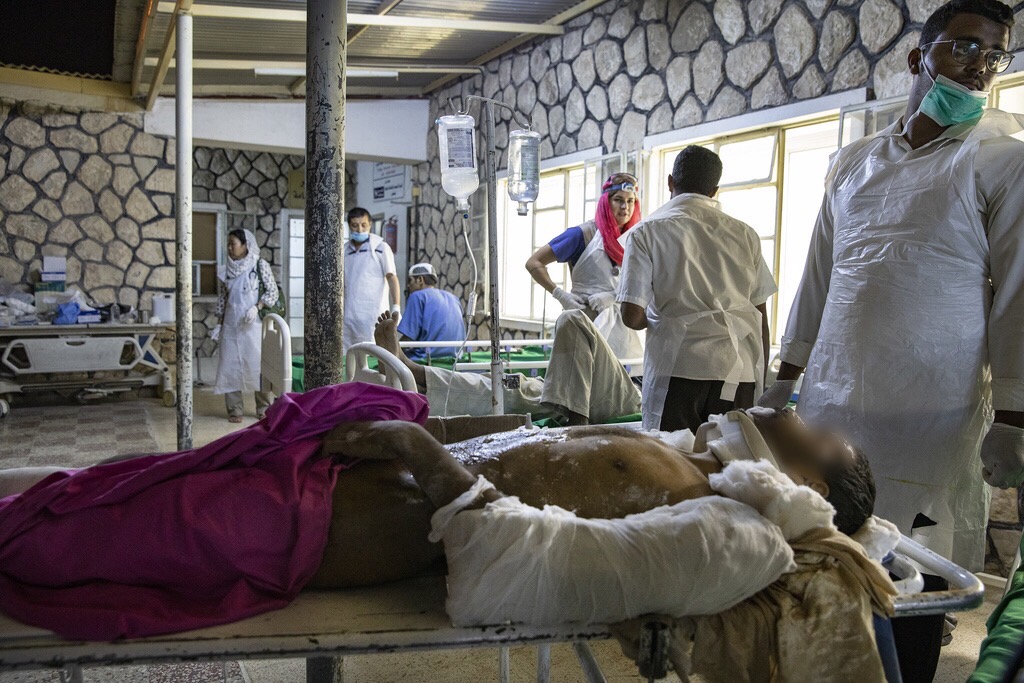Updates & Press
Reports | July 22, 2020
A Tipping Point for Yemen’s Health System: T
Author | MedGlobalComms

“COVID-19 shook countries with advanced health systems and services. What will it do to a country like Yemen that has lived in the shadow of war for five years?”
– Dr. Nahla Arishi, Yemeni pediatrician in Aden
In Yemen, where an already weak health system has been destroyed by five years of conflict and 80% of the population is in need of humanitarian assistance, COVID-19 is exacerbating what was already the world’s worst humanitarian crisis.
MedGlobal, alongside partners Project HOPE and the Center for Global Health at the University of Illinois, details the ongoing impact of COVID-19 on Yemen’s fragile health system in its new report: A Tipping Point for Yemen’s Health System: The Impact of COVID-19 in a Fragile State. There have been 1,610 confirmed cases and 446 deaths from COVID-19 according to official reports. This amounts to around a 27% mortality rate of Yemenis who are confirmed to have COVID-19 – more than 5 times the global average and among the highest COVID-19 mortality rate in the world.
The COVID-19 outbreak is also disproportionately harming one of Yemen’s most critical human resources: health workers. This report documents 97 health workers – epidemiologists, medical directors, midwives, and other critical medical professionals – who have died in Yemen reportedly from COVID-19. In this uniquely dire context, when one medical professional dies, the effect is exponential and extends to their entire community.
This report explores how COVID-19 is exacerbating the already overwhelming health crisis in Yemen, particularly focusing on:
- Insufficient testing capabilities across the country.
- A lack of necessary infrastructure for COVID-19 prevention and management.
- A lack of supplies particularly ventilators, oxygen generators, and oxygen cylinders.
- The need for increased training for health personnel, particularly those staffing isolation units, in best practices and COVID-19 case management.
- The high infection rate and deadly effects of COVID-19 on health staff.
- Multi-year cuts to medical personnel salaries and incentives – most health staff have not received salaries for nearly two years.
- The immense shortage in necessary funding for the humanitarian response.
- The worsening economic crisis, which will likely increase the number of people in acute need.
The report identifies several recommendations based on information from health teams in Yemen, including the following:
- To INGOs and UN agencies:
- Scale up diagnostic and testing capabilities.
- Increase the provision of supplies for COVID-19 prevention and management and training for health workers.
- Maintain core health services, particularly health care for non-communicable diseases, maternal and child health, and infectious disease management (particularly dengue, chikungunya, and diphtheria).
- Expand mental health and psychosocial support programming, particularly for medical staff, people who have recovered from COVID-19, and community health workers.
- Prioritize protection of the most vulnerable, particularly IDPs and refugees, and duty of care for health and humanitarian workers.
- To the Yemen government and de facto authorities:
- Halt hostilities nationwide.
- Facilitate unhindered humanitarian access throughout the country and ensure respect for humanitarian principles.
- Strengthen reporting and detection systems.
- Prioritize supporting health care workers and their protection, including through consistent staff salaries.
- To the U.S. government
- Increase humanitarian assistance to all of Yemen based on the most critical needs.
- Reinstate membership in the WHO and support its response in Yemen.
- Prioritize a resolution to the conflict.
- To all donor governments:
- Fully fund the Yemen Humanitarian Response Plan.
- Work to ensure health workers are supported and protected.
Without a strong and comprehensive response to mitigate the effects of COVID-19 and suppress its transmission, the numbers of COVID-19 deaths, including amongst doctors, is expected to rise rapidly in Yemen. The effects of the pandemic could be deadlier and longer-lasting than in most other countries. The people of Yemen must not be forgotten.


